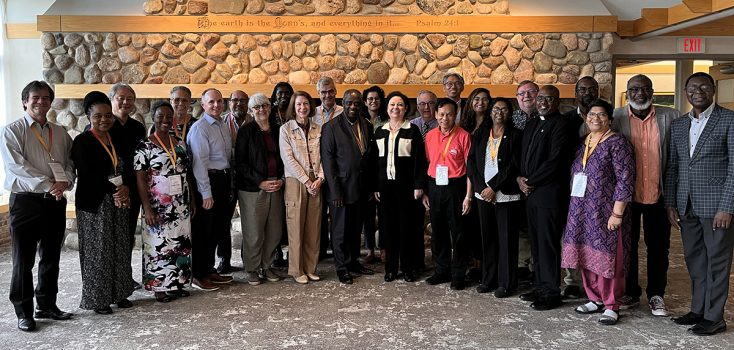The Executive Committee of the World Communion of Reformed Churches (WCRC), meeting 18-22 May 2024, in West Michigan, USA, has called its members and partners to prayer, action, and preparation.
Returning to the location of the 2010 Uniting General Council, the Executive Committee found a country facing severe challenges. “Christian nationalism, rising authoritarianism, and the scourge of racism are tearing at the very core of this nation,” the Executive’s message stated.
Two presentations informed the Executive on these issues. The first, featuring Calvin University history professors Kristin DuMez and James Bratt, focused on Christian nationalism.
Three models of Christian belief were noted that ebb and flow through American history: the holy commonwealth, constitutionally-protected pluralism, and the spirituality of the church, the latter positing that worldly issues are not the concern of the church.
While Christian nationalism has connections with the third, it is often more secular than faith-focused, with few adherents regularly attending church and an increasing number not believing that Jesus Christ is God. “It’s a subculture that is far from biblical traditions,” said DuMez.
A panel on racism featured six Grand Rapids, Michigan, residents, each of whom is involved in efforts to counter both systemic and personal racisms found in the area. Moderated by Monica Schaap Pierce, executive secretary of Christian Churches Together, the speakers were Jathan Austin, Grand Rapids Association of Pastors board member; Terry Dixon, Grand Rapids police officer and coordinator of the Clergy on Patrol program; Victoria Gibbs, founding member of Communities Organizing for Racial Equity; Jack Kooreman, founder of Grand Rapids Association of Pastors; and Reggie Smith, ministry consultant with Thrive, a ministry of the Christian Reformed Church in North America.
They detailed the historical racism prevalent in Grand Rapids, noting that segregation—both geographical and economic—continues to this day. While efforts to combat racism have been happening for years, the shooting of a Black man by police officers sparked a renewed commitment by local churches to become actively involved.
“Human beings deserve to be reconsidered in the light of Christ,” said Smith.
“What’s hindering racial reconciliation? Honesty—you cannot get over what you won’t confront. If you’re not willing to confront the real issues, how can you address them?” said Austin.
The message from the Executive stated:
The U.S. strain of Christian nationalism is particularly virulent as it includes the supreme confidence that God is on the side of the U.S., that their “battles” are one. Authoritarian impulses bleed from this belief, with an unholy goal of restricting participation to the “chosen” few. Racism runs deeply throughout U.S. society, the unresolved repercussions of slavery and segregation most prominent, but the discrimination of all black and brown bodies who find themselves in the country or at its border must not be neglected.
The message did not focus solely on the United States, noting troubles around the world. In its call, the Executive asked for prayer for upcoming church assemblies in North America and for those “working for truth and justice throughout the world.” It also called for action:
- Petition your governments to:
- establish an immediate ceasefire in Gaza
- demilitarize the Korean Peninsula
- cease arms sales to Israel
- end the embargo against Cuba
- enact measures to counter the climate catastrophe
- develop humane immigration policies for migrants
- Consider contributing to the upcoming WCRC fundraising campaign
- Commit to engage in dialogues for deeper understanding of our responsibilities as witnesses to the liberating love of Jesus Christ
Finally, the message called for preparations toward the upcoming General Council, to be held 14-23 October 2025 in Chaing Mai, Thailand. The message concluded, “The theme ‘Persevere in your witness’ requests us to embrace the death-dealing reality with a kenotic (self-emptying) spiritualty and love, reaffirming our faith in Christ at the Cross and envisioning a life-giving hope in action.”
The Executive Committee itself continued preparations for the Council by receiving an update from the General Council Planning Committee and spending considerable time reviewing the programmatic concept papers, which will soon be distributed to member churches for their review.


